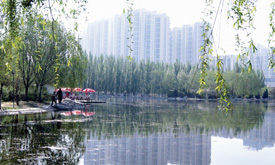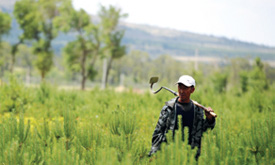|
 |
 |
|
LIVABLE AGAIN: Baotou, a major steel producer in north China's Inner Mongolia Autonomous Region, has brought its once-infamous air pollution under control after massive government investments in environmental projects over the past decade (CFP) |
A GREEN BANK: Liu Yucai, a farmer in Youyu County, Shanxi Province, works in his forest of Scots pine. The forest of nearly 4 hectares on formerly barren land has brought him handsome financial rewards (YAN YAN) |
Chen Baosheng, Vice President of the Party School of the CPC Central Committee and a delegate to this year's CPC congress, said that Hu's report shows China will pursue an energy-saving and environmentally friendly development path featuring harmony with nature and cast away the traditional path of extensive development.
Fan Hesheng, a sociologist from east China's Anhui Province, said that the emphasis on green development reflects the CPC's deepened understanding on the relationship between nature and humanity. "The Party shows sense of responsibility for future generations and the world as well," Fan said.
Yu, who plans to open a small hotel in the countryside to woo urban residents with fresh air and organic food, believes such development can bring farmers immediate benefits. "The scale of organic livestock farming will be expanded and slaughter and processing facilities will be built so that local farmers will have higher incomes," she said.
Consonant voices
Erhai Lake is the most famous tourist attraction in Dali Bai Autonomous Prefecture, southwest China's Yunnan Province, with its picturesque beauty. It has long been regarded by local people as Mother Lake since fish from the lake is an important food source. However, it was severely polluted in the late 1990s when new factories sprang up. Sample tests showed water in the lake was suitable only for irrigation, not for human contact. A massive blue-green algal bloom in 2003 was a wake-up call for local government officials, who then decided to revolutionize Dali's development model. The same year they launched an environmental publicity campaign to protect the lake.
Yin Jianye, Party chief of Dali Bai Autonomous Prefecture, told China Youth Daily that over the past 10 years or so, the local government has closed down a large number of polluting factories around Erhai and spent billions of yuan improving its water quality.
Now a beautiful natural environment has become Dali's competitive edge.
Yin said the water quality in Erhai has recovered so much that it is currently suitable as drinking water and a habitat for endangered animals. The environmental recovery has also boosted local tourism. Last year, Dali received a record 15.6 million tourists. The number is expected to surpass 18 million this year.
Yin said after several ups and downs, local officials have realized that emphasizing ecological progress can expand an area's development space.
Wang Jiangping, Director of Guizhou Provincial Commission of Economy and Information Technology, was repeatedly asked during the 18th CPC National Congress whether Guizhou, a less developed landlocked province, would accept investment proposals from energy-intensive and highly polluting factories relocated from China's eastern areas.
Wang said that Guizhou used to welcome such proposals, but times have changed. According to Wang, the province has closed down many cement, metal alloys, paper and leather factories with obsolete production facilities since the beginning of this year, which incurred a total loss of 60,000 jobs and 8 billion yuan ($1.28 billion) in its GDP.
"Although the local economy may suffer in short term, longterm sustainable development with a better industrial structure is more likely," Wang said, adding that a recycling economy is replacing a resources-based economy in Guizhou.
When Li Jun, Party chief of Guiyang, the provincial capital, spoke at a panel discussion on Hu's report during the 18th CPC National Congress, he shared his surprise at how many times "ecological progress" appeared in the report.
| 